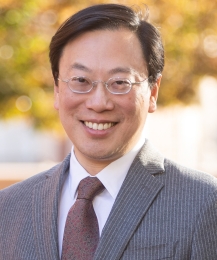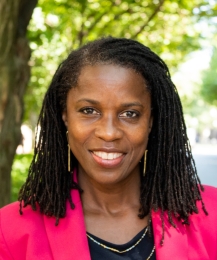Faculty Offer Insiders’ Account of Presidential Commission on the Supreme Court
At a Lawyers, Community, and Impact event, Columbia Law Professors Kate Andrias, Bert Huang, and Olatunde C. Johnson who served on the commission explain why the SCOTUS report is a must-read.
In April 2021, President Joe Biden announced that he was establishing a Presidential Commission on the Supreme Court of the United States; he named three members of the Columbia Law School faculty to the 36-member panel: Kate Andrias, professor of law; Bert Huang, Michael I. Sovern Professor of Law; and Olatunde C. Johnson, Jerome B. Sherman Professor of Law. At a Lawyers, Community, and Impact (LCI) event moderated by Vice Dean for Intellectual Life and Charles Keller Beekman Professor of Law David Pozen on January 26, the professors gathered for a postmortem on the commission’s report, which was delivered to the president on December 7, 2021.
Andrias, who served as the commission’s rapporteur, explained that its charge was to provide an account of current debates about the Supreme Court—“an analysis, not a policy proposal”—and “to evaluate the strengths and weaknesses of particular reform proposals,” she said.
The commission heard from dozens of expert witnesses. “These are public deliberations and public meetings,” said Huang, noting there was a wide range of legal and ideological perspectives represented and that video recordings of the full meetings are available on the White House website.
Huang also said the report’s five chapters provide a historic overview of debates on Supreme Court reforms; examine the court’s role in the constitutional system; address term limits and court expansion; and consider reforms to internal procedures, judicial ethics, and transparency.
The commission received thousands of comments from the public, and Johnson said that the largest number of them were about term limits and expanding the court. “The idea that’s discussed in the commission report is 18-year term limits,” she said.
The panelists repeatedly emphasized that the report does not include specific recommendations, but Johnson added, “I think it does a very valuable job of really sorting through some of the design challenges and constitutional challenges and what solutions to those might be.”
Andrias said the commission’s process and bipartisanship were refreshing in an era of ideological polarization. “It leaves me more optimistic in the sense that it underlined for me the value of deliberation, of careful thought, of really listening to a wide range of commentators,” she said. “It’s not very often in our current world where you really have extended conversations with people who hold diametrically opposed views. And I left the experience feeling somewhat reassured that that can happen, and it can be productive, and it can be respectful.”
Watch the full event: Supreme Court Reform: A Conversation With the CLS Commissioners.


